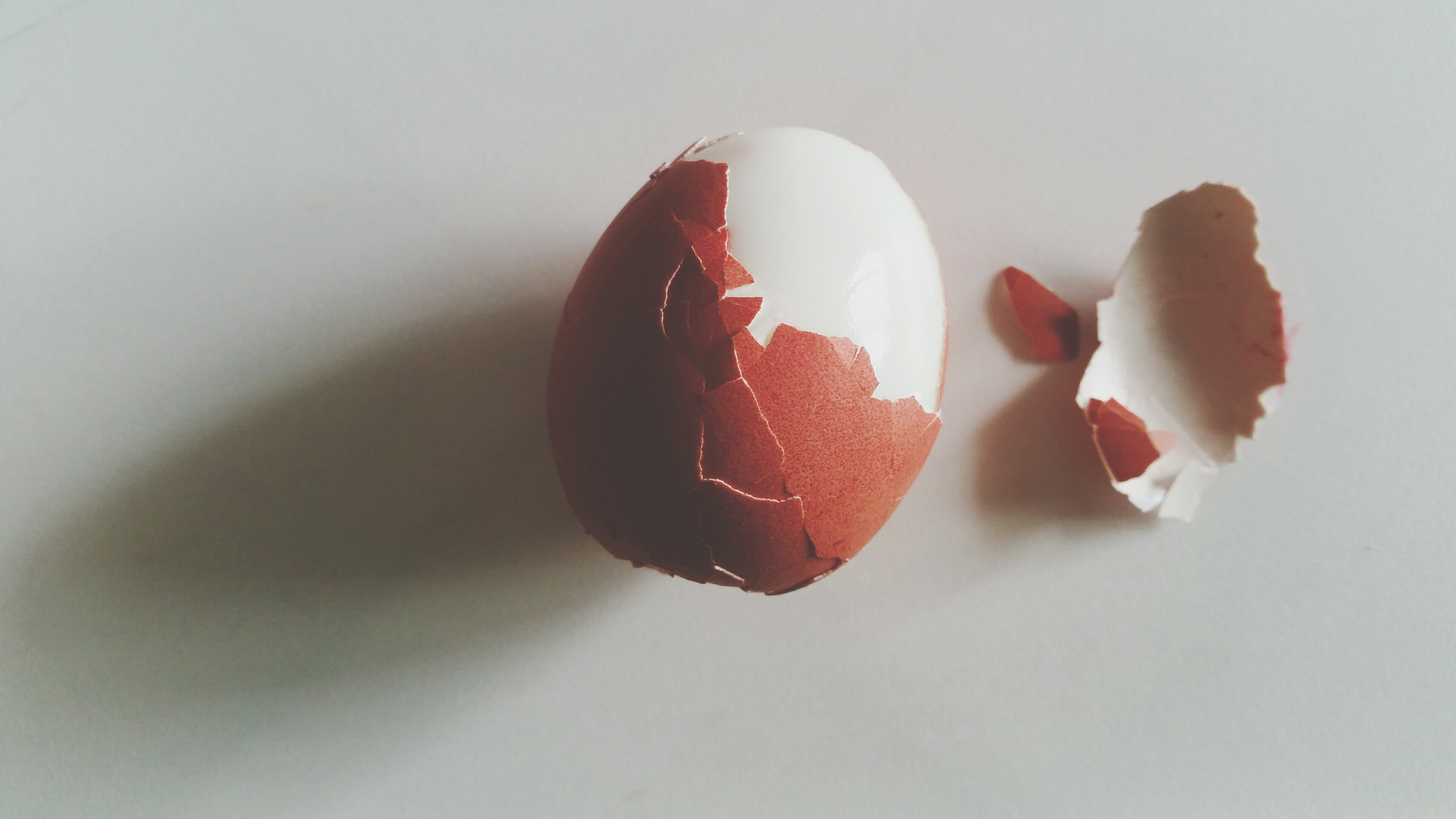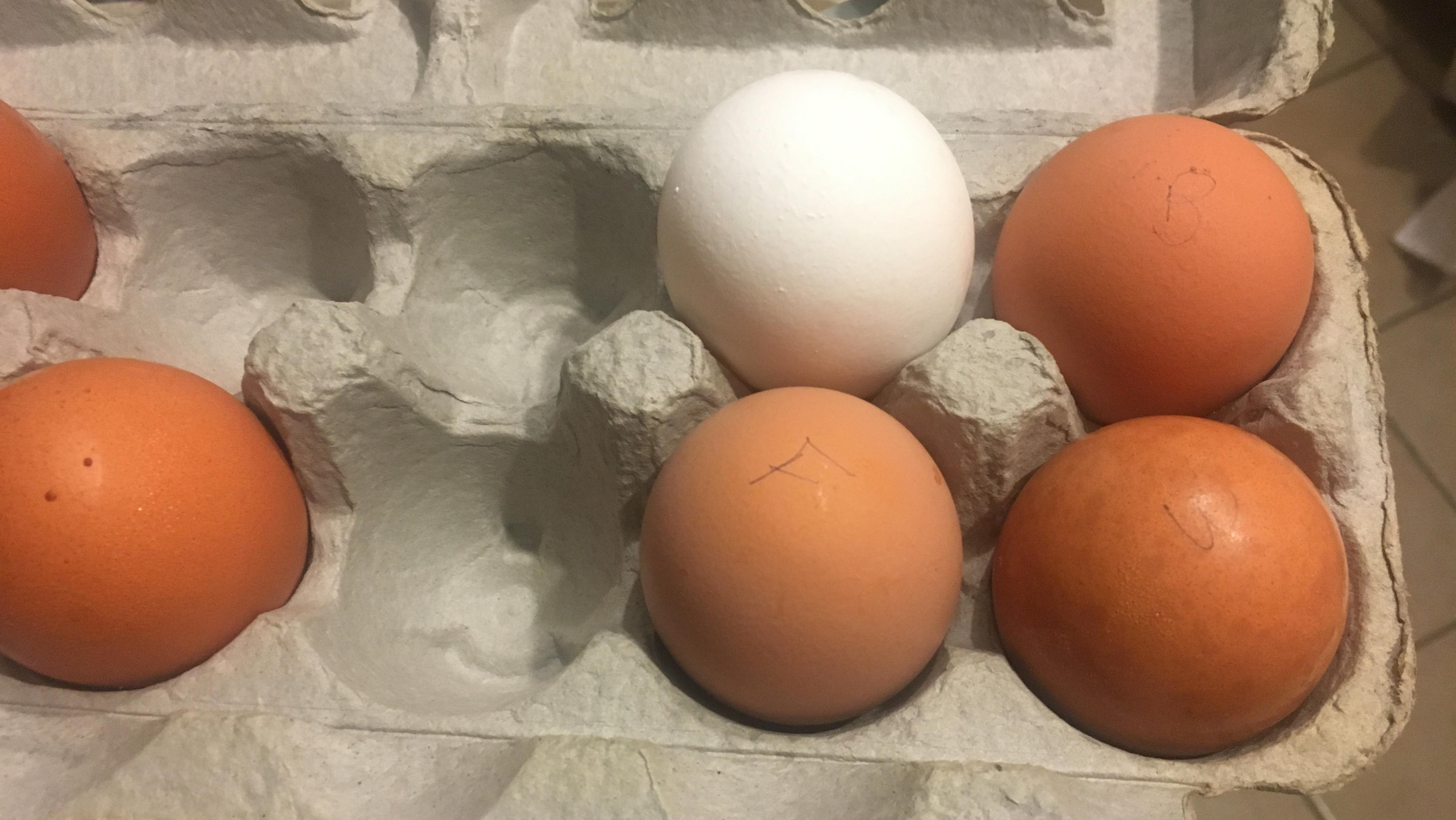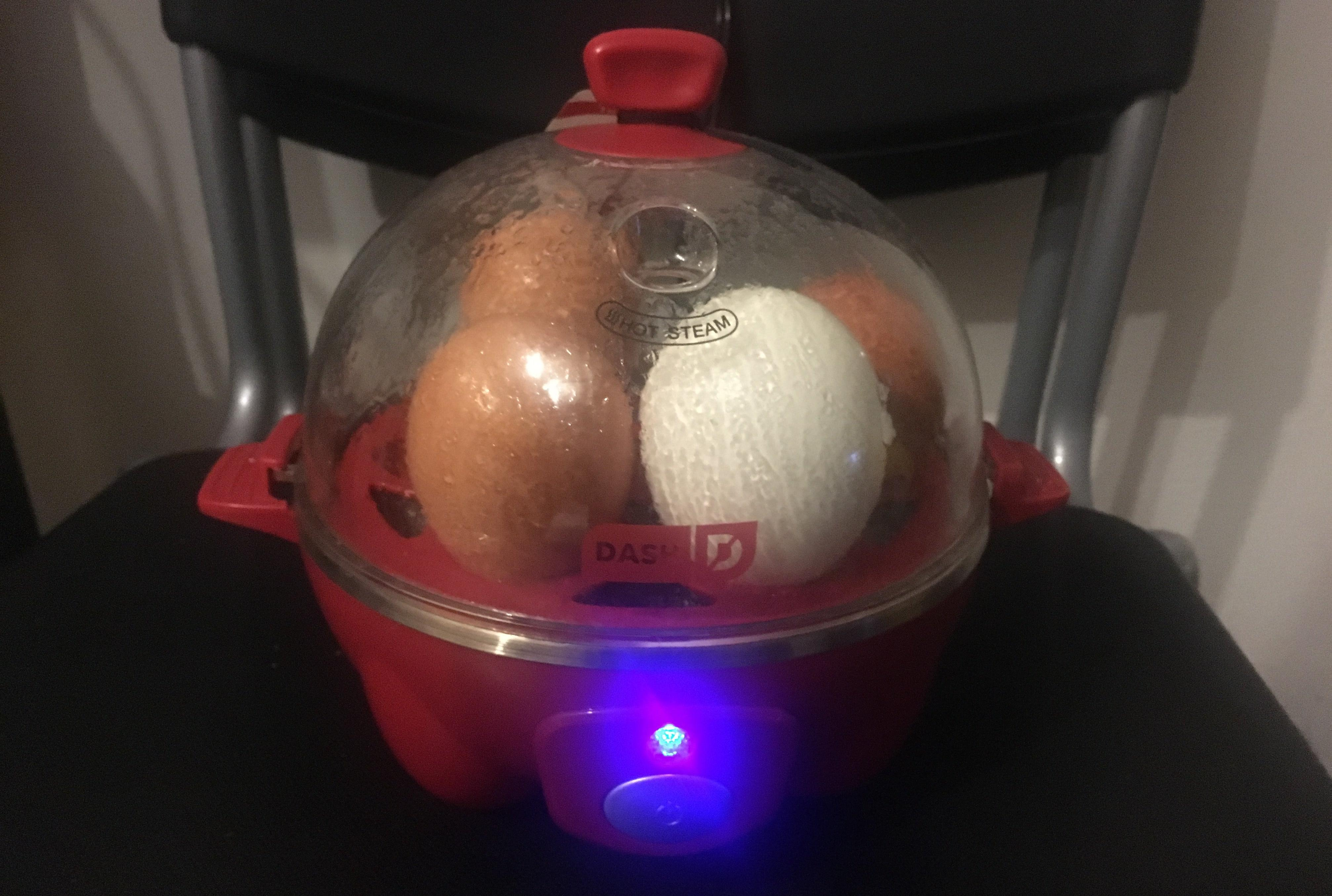What's The Best Way To Hard-Boil And Peel An Egg?
Tips for cooking eggs, and the easiest way to peel the shells without frustration.
We may receive a commission on purchases made from links.
In the course of a life, one stumbles through the occasional invisible door, and once one passes through such a door, there is no turning back. They make a choice, express a preference, mention that they happen to really like this one book or that one color, and bam, the door slams behind them. The old Allison is dead. Long live the new Allison, who apparently loves teacups now. You might say this has never happened to you. In response, I would smile, and nod, and then turn to your rack full of state-themed shot glasses to ask them what they thought about that.
That's a long way of saying that a few weeks ago, I wrote about my beloved egg cooker, and bam, I am now the egg person at The Takeout. This is not a complaint! I do, in fact, love eggs. Scrambled egg sandwiches are one of my go-to comfort foods. When I perfected the holy-shit-I'm-starving-but-running-late microwave egg technique, it made my 20s infinitely more tolerable. Poached eggs make me feel all fancy and shit. Bibimbap is a perfect food. Eggs are great. Happy to be the egg person. It's way better than teacups.
This is how I found myself standing in my tiny, steamy kitchen on a weekday night, surrounded by eggs with letters scribbled on the shells in pen, vigorously shaking a pot I had covered with a plate. The pot had water and a single hard boiled egg inside it, and as I dutifully jostled it around, water flew absolutely everywhere. The idea, so the internet assured me, was that when I removed the plate, the egg would be peeled! This did not happen, but it was one of few outright failures. Hard boiled eggs are easy to make, but there's a lot of pleasure to be found in making them really, really well—if only because peeling them is so satisfying.
How do you make the best hard boiled eggs?
My quest was a simple one. I wanted to make great hard boiled eggs. That meant breaking down the process into three components: the selection of eggs, the method of cooking (and cooling), and the peeling itself. It also required clearing out some space in my fridge, sending my partner out for a bag of ice when I realized how soon I'd be out, and getting out the smoked sea salt and fancy mustard, because if I was going to do this, I was damn well going to enjoy it. Reader, I did.
First, some caveats. I controlled for as much as I could, but my process was far from scientific (sorry, Mr. Bergeon, you taught me better than this in middle school, I know). My pots aren't identical, and I used a gas range, so there was inevitably some variation in heat. While my partner was more than happy to fetch ice, he was understandably reluctant to spend two hours sweating over many many boiling eggs, so I was moving the eggs from heat to cold with only two hands and a lonely slotted spoon. And last, I have the hand-eye coordination of a blindfolded, mitten-wearing four-year-old, so some of the peeling techniques I fumbled might work brilliantly for you.
My sources
I tried what I learned as a kid, of course, but also asked friends and consulted my well-loved Mark Bittman cookbook. Then I dove into the warm embrace of the internet: Genius Kitchen, Cook's Illustrated, The Pioneer Woman, and so on. Then I spent just so much time watching egg peeling videos on YouTube. They are oddly soothing.
Which eggs are best for hard boiling?
I've long heard that older eggs are better for hard boiling; the oldest eggs I had were about two weeks old (from a stand at a farmer's market). I also picked up fresh eggs from the same stand and a dozen brown eggs and white eggs each from the grocery store. The store-bought eggs came out of the fridge, the market eggs did not.
I expected the differences here to be mostly peeling-related. That wasn't the result. Generally speaking, the older eggs were sometimes easier to peel, but only slightly, and not consistently. Ease of peeling had much more to do with the method I used to cook and/or peel.
However, with every method I tried, nearly all of the store-bought white eggs were slightly less done than the brown eggs and market eggs (most of which were brown). I have no idea why this is, as there's supposed to be no difference between them. To be totally frank, it seemed like controlling for shell color would be a weird, silly thing to do, and I did not expect it to make any sort of difference at all. But hey, anecdotally, it sure looks like leaving white eggs in for a minute or two longer isn't the worst idea.
Which egg boiling method is best?
There were so many variations on boiled eggs, mostly related to cooking time, but here's what I ultimately tried. In all cases, I shocked the eggs in ice water afterward, usually for around seven minutes.
- Placing the eggs in cold water, bringing the water to boil, and leaving them to simmer for about 10 minutes. This is a bad method and I should not have tried it. They all warned me. The eggs were difficult to peel and the yolks had that greenish tinge.
- Placing the eggs in boiling water, adjusting the boil down to a simmer, and leaving them for about 10 minutes. This method led to the biggest difference between the slightly older eggs and the rest of the eggs. Still, they were all pretty good.
- Same method, but with a tablespoon of white vinegar in the water. These were definitely easy to peel, and the yolks (except for the white eggs) were perfect. Only one other method was easier, and I honestly think that's because after about two hours of peeling eggs I was much, much better at it.
- Same method, but with a tablespoon of white vinegar and a big pinch of salt in the water. These still turned out nicely, but were slightly less easy to peel. Again, I am a useless fumble-fingered doofus, so the problem may have been me, and not the salt.
- Steaming over a pot of boiling water for about 6 minutes. These came out soft-boiled, and it's entirely because I read the Cook's Illustrated piece too quickly. But hey, those soft-boiled beauties were just about perfect.
- Steaming over a pot of boiling water, under a lid, for about 10 minutes. The easiest to peel, with a slight edge over the vinegar method. None of the white eggs I steamed came out undercooked. (Seriously, what's the deal there?)
- My trusty egg-cooker. The results here were very similar to the plain-old boiling method, except that there was a very loud alarm at the end of the cooking process, so this is the method to use if you're hoping to scare the crap out of your cat.
The best way to peel your hard boiled eggs
Reader, I tried so many methods. I tried this crazy shit. It did not work. I tried cracking the bottom, peeling off a little circle, and running a spoon around the inside. It was a mess. I tried the aforementioned pot-shaking method and made an even bigger mess. There were many others, most of them kind of useless (and again, that might just be me.) In nearly all cases, the egg got peeled—it just sometimes took a little longer. I did, however, land on one consistently useful trick, one handy method, and one work of genius.
- The trick: crack the bottom first. Most of the time, there's an air pocket down there. That makes it the easiest place to get a hold on the eggshell membrane without dinging the egg itself. Once you've got that thing in your grip, it's all pretty easy.
- The useful method: lightly crack the bottom, then roll the egg across the counter or table a few times. The shell seems likely to come off in lots of little pieces, but in reality most of those pieces stick to the membrane and it all comes off quickly.
- The work of a genius. I tried this method with a steamed egg and a boil + vinegar method egg, and it blew my mind. You put the eggs (it apparently can work with multiple eggs, not just my meager two) in a plastic container with some water, then place a fitted lid on top. Then you shake the container a bunch. In the video linked above, the "egg aficionado" had to do some minor peeling afterward. Not so for me. The whole damn shell came off of both eggs (though more quickly for the steamed egg). All I did was rinse them to make sure there were no tiny shell bits stuck to the surface.
Conclusion
First, I might need a time out on eating hard boiled eggs for a bit. My fridge is nuts at the moment. Also, I'm afraid for my cholesterol.
Second, when I'm multitasking, I will probably still stick with my egg cooker (and use the rolling method for peeling), but only if I'm really distracted or busy. Otherwise, the steaming method was insanely simple and the eggs peeled beautifully.
Last, I will be busting out that shaking-in-Tupperware trick at every opportunity.
This concludes my highly unscientific and somewhat messy egg study. Please explain the white egg thing in the comments.


